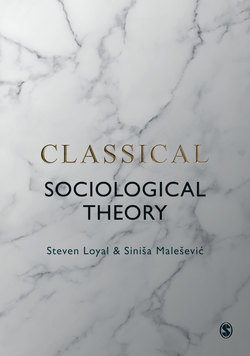Читать книгу Classical Sociological Theory - Sinisa Malesevic - Страница 27
На сайте Литреса книга снята с продажи.
The Politics
ОглавлениеAristotle begins The Politics by discussing the state as the highest form of association, aiming at the highest of all goods. He offers a hypothetical theory of state formation rooted in nature and teleological explanation, as the final and highest form of association that is self-sufficient. The private counterpart to the public association of citizens – the polis – that aims at securing the good life, is the household – oikos – which meets daily needs, and a collection of which constitutes a village. In the household, the man as master naturally dominates the women as he does the slave and children. This contrasts with the domination in the political sphere, which is by free individuals or citizens over one another both through their acquiescence and through just law (Frisby and Sayer, 1986: 15).
There is, for Aristotle, a natural and unnatural way of acquiring a good or object. Though they share with animals the acquisition of goods from their surrounding environment, humans also possess different ways of living through their natural productive labour: as nomads who move with their domesticated animals; as hunters and pirates; and by agriculture. Some peoples combine all three types of existence. Just as these modes of acquisition are given by nature, so too is the food chain. This includes acquiring animals, but also other peoples; war itself is a result of nature.
There is, however, a second method of acquiring goods. In what was to become central to Marx’s argument in his distinction between use-value and exchange-value in Capital, Aristotle argues that pieces of property have a double use, one of which is the proper use, the other for exchange. For example, a shoe can be put on a foot, its proper use, or become an object of exchange, an improper use. The latter emerges as a result of the mutual needs of many individual households having too much of one good and not enough of the other. Exchange is not contrary to nature since it aims to re-establish nature’s own equilibrium of self-sufficiency. It is on this basis that money-making arose. Trade was initially a simple affair but became more complex as people became aware of where the greatest profits could be made from exchanges. However, when trade goes beyond the self-sufficiency required by a community it becomes unnatural since the unlimited acquisition of wealth becomes an end in itself for some people. For Aristotle the constitution is the citizen-body and constitutions can be distinguished according to the numbers of those who rule. Hence in democracies the masses are sovereign while in oligarchies it is only the few. There are three correct constitutions which can be differentiated in terms of numbers and that aim at the common good – monarchy (kingship), aristocracy and ‘polity’. In the first one man has virtue; in the second, the best few rule; in the last, some, but not all rule since it is difficult for a large number to gain virtue except in military terms. Corresponding to these there exist three deviant constitutions that aim at the private advantage of the rulers – tyranny, oligarchy, and democracy. These constitutions are ranked with hereditary monarchy being the best, aristocracy next, followed by polity, democracy, oligarchy, with tyranny rooted at the bottom. However, Aristotle then modifies this view of constitutions by arguing that we in fact need to look at economic factors for distinguishing constitutions rather than simply numerical criteria: ‘what really differentiates oligarchy and democracy is wealth or the lack of it. It inevitably follows that where men rule because of the possession of wealth, whether their number be large or small, that is oligarchy, and when the poor rule, that is democracy’ (Aristotle, 1998: 1279b26).
